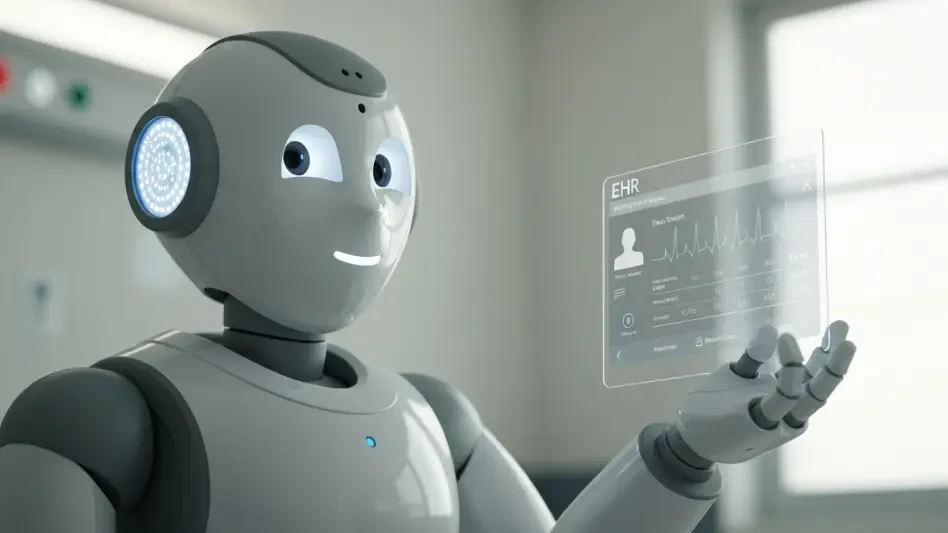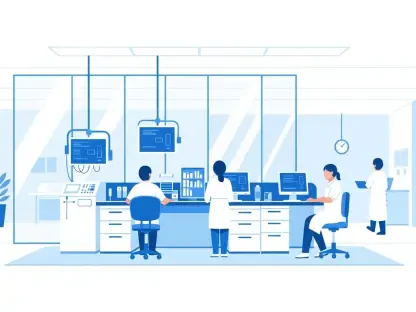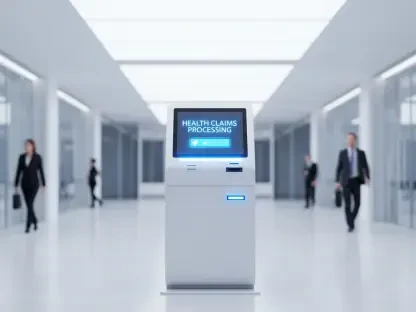In an era where healthcare providers grapple with an overwhelming volume of patient data, imagine a system that not only manages this deluge but also anticipates clinical needs with uncanny precision, transforming the way care is delivered. Electronic Health Record (EHR) systems, long criticized for burdening clinicians with administrative tasks, are undergoing a radical transformation through the integration of generative AI. This technology promises to streamline workflows, reduce errors, and enhance patient care by automating routine processes and synthesizing complex information into actionable insights. This review delves into how generative AI is reshaping EHR platforms, offering a detailed examination of its capabilities, real-world impact, and the challenges that lie ahead in this dynamic landscape of healthcare innovation.
Understanding Generative AI’s Role in Healthcare
Generative AI stands as a groundbreaking force in healthcare, leveraging advanced algorithms to create, interpret, and manage data in ways previously unimaginable. At its core, this technology excels in data synthesis and automation, enabling EHR systems to handle vast datasets with improved accuracy. By mimicking human-like reasoning, it addresses critical pain points such as data overload, which often overwhelms traditional EHR setups and hampers clinical efficiency.
The integration of generative AI into EHR platforms represents a pivotal shift in healthcare technology. It tackles longstanding issues like administrative burdens by automating repetitive tasks and presenting information in intuitive formats. This capability not only saves time but also allows clinicians to focus on patient interaction rather than paperwork, aligning with broader goals of enhancing care delivery.
Beyond immediate benefits, the relevance of generative AI lies in its potential to evolve alongside healthcare demands. As patient data continues to grow in complexity, the adaptability of AI-driven systems ensures they remain effective tools for providers. This adaptability positions generative AI as a cornerstone for future innovations in medical technology.
Core Features of Generative AI in EHR Platforms
Automation of Routine Tasks
One of the standout features of generative AI in EHR systems is its ability to automate mundane, time-consuming tasks. Processes like data entry, appointment scheduling, and billing updates, which previously consumed significant clinician time, are now handled with remarkable speed and precision. This automation directly reduces workload, allowing healthcare professionals to prioritize patient care over clerical duties.
The performance of AI in automating these tasks has shown measurable improvements in workflow efficiency. Studies indicate a notable decrease in time spent on administrative functions, with error rates dropping significantly due to AI’s consistent processing capabilities. Such advancements translate into tangible benefits, including reduced burnout among staff and more streamlined operations in busy healthcare settings.
The significance of this feature extends beyond individual providers to entire healthcare systems. By minimizing manual input, generative AI helps standardize processes across departments, ensuring consistency in data handling. This standardization is crucial for maintaining high-quality care in environments where coordination among multiple teams is essential.
Data Synthesis and Intuitive Presentation
Another powerful aspect of generative AI in EHR systems is its capacity to process enormous volumes of patient data and present it in user-friendly formats. Unlike traditional systems that often display information in dense, unorganized ways, AI synthesizes data into concise summaries, highlighting critical insights for quick clinical decision-making. This transformation of raw data into actionable intelligence marks a significant leap forward.
Performance metrics for AI-driven data presentation reveal high levels of accuracy and relevance in the information delivered. Clinicians report faster access to vital patient details, such as medical histories or treatment responses, which directly enhances diagnostic precision. The technical prowess of AI in filtering out noise and focusing on pertinent data points ensures that healthcare providers are equipped with the right information at the right time.
In real-world scenarios, this feature has proven invaluable during high-pressure situations like emergency care, where rapid decisions are critical. The ability of AI to distill complex datasets into clear, prioritized visuals or summaries empowers doctors to act swiftly without wading through irrelevant details. This impact underscores the technology’s role in improving patient outcomes through better-informed care.
Recent Advancements in AI-Driven EHR Workflows
The landscape of EHR systems is evolving rapidly, driven by cutting-edge developments in generative AI applications. Innovations such as programming-inspired workflow designs have introduced dynamic systems that adapt to user interactions in real time, offering a level of flexibility unseen in earlier EHR iterations. These adaptive frameworks draw from software engineering principles to ensure seamless updates and scalability as healthcare needs change.
Emerging trends also point toward increasingly sophisticated AI tools that anticipate clinician requirements before they are explicitly requested. For instance, real-time response systems can suggest diagnostic pathways or treatment options based on patient data trends, effectively acting as a virtual assistant. Such advancements are reshaping how healthcare delivery is conceptualized, moving toward proactive rather than reactive models of care.
These technological shifts are influencing broader healthcare paradigms, encouraging a focus on efficiency and personalization. As AI continues to refine EHR workflows, the ripple effects are seen in shorter patient wait times, more accurate record-keeping, and enhanced coordination among medical teams. This evolution signals a future where technology and human expertise work in closer harmony to elevate care standards.
Real-World Applications and Use Cases
Across diverse healthcare settings, generative AI is already making a tangible impact through practical EHR implementations. Hospitals have adopted AI tools to streamline operations, such as automating patient intake processes and flagging critical lab results for immediate attention. These applications reduce delays and ensure that urgent cases receive prompt intervention, directly benefiting patient safety.
In outpatient clinics, AI-enhanced EHR systems are personalizing care by tailoring treatment plans to individual patient profiles. By analyzing historical data and current health metrics, the technology suggests customized interventions, from medication adjustments to lifestyle recommendations. This level of personalization fosters stronger patient-provider relationships and improves adherence to treatment regimens.
Notable deployments also highlight improved user experiences for clinicians. In several large medical centers, AI has been integrated to provide voice-to-text documentation, allowing doctors to dictate notes during patient encounters effortlessly. This innovation not only saves time but also enhances the accuracy of records, showcasing how generative AI bridges operational gaps in real-world healthcare environments.
Challenges and Limitations in Adoption
Despite its promise, the integration of generative AI into EHR systems faces significant hurdles that must be addressed for widespread adoption. Technical challenges, such as ensuring system scalability to handle growing data volumes, pose a barrier, especially for smaller healthcare facilities with limited resources. Developing infrastructure that can support AI without frequent disruptions remains a priority.
Regulatory concerns around data privacy and security add another layer of complexity. Strict compliance with laws governing patient information requires robust safeguards within AI systems to prevent breaches and maintain trust. Balancing the benefits of data-driven insights with ethical responsibilities is a delicate task that demands ongoing vigilance and policy development.
Market barriers, including high implementation costs and resistance to change among staff, further complicate adoption. Many organizations struggle to justify the initial investment, while others face challenges in training personnel to use advanced systems effectively. Efforts to mitigate these issues through comprehensive user education and ethical frameworks are underway, aiming to smooth the transition to AI-powered EHR platforms.
Future Outlook for Generative AI in EHR
Looking ahead, the trajectory of generative AI in EHR systems appears poised for remarkable growth and innovation. Potential breakthroughs, such as predictive analytics that forecast patient health risks with high accuracy, are on the horizon, promising to shift healthcare toward prevention rather than reaction. These tools could redefine how providers approach chronic disease management over the coming years.
Intelligent data management solutions also hold promise for transforming EHR functionality. By automating data categorization and retrieval processes, future AI systems may eliminate inefficiencies entirely, allowing seamless access to records across platforms. Such advancements would enhance interoperability, a critical need in modern healthcare networks, from 2025 onward.
The long-term impact of these innovations on healthcare delivery is expected to be profound, with improved patient outcomes and clinician satisfaction at the forefront. Continued collaboration between technology developers, healthcare professionals, and policymakers will be essential to realize this potential. This collective effort could usher in an era where EHR systems are not just tools, but intelligent partners in care.
Final Reflections on the Technology
Reflecting on the journey of generative AI in EHR systems, it becomes evident that this technology has carved a transformative path in healthcare by tackling inefficiencies head-on. Its ability to automate tasks, synthesize data, and personalize care has already begun to redefine clinical workflows in meaningful ways. The real-world impact, from streamlined hospital operations to tailored patient treatments, has demonstrated its value across diverse settings.
As the technology continues to evolve, actionable next steps emerge as critical considerations. Healthcare organizations need to invest in robust training programs to ensure staff can fully leverage AI tools, while policymakers must prioritize ethical guidelines to protect patient privacy. Partnerships across disciplines stand out as a vital strategy to address scalability and cost challenges.
Looking toward future horizons, the focus should remain on fostering innovation through pilot programs that test predictive analytics and advanced data management solutions. By embracing a mindset of continuous improvement, the healthcare industry can build on the foundation laid by generative AI, ensuring that EHR systems evolve into intuitive, indispensable allies in the mission to enhance patient well-being.









